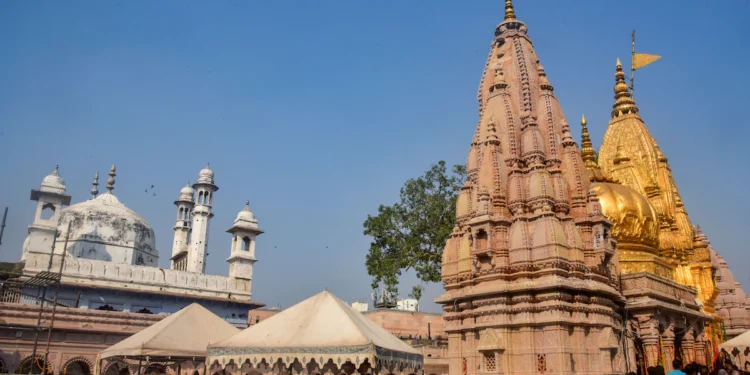VARANASI, FEBRUARY 1,2024 (ozi news desk):
Following a district court’s order, members of a Hindu priests’ family in Varanasi have begun their prayers in the basement of the Gyanvapi mosque. This comes after the premises were sealed for 30 years on the instructions of former Uttar Pradesh Chief Minister Mulayam Singh Yadav, shortly after the demolition of the Babri Masjid. Vishnu Shankar Jain, the lawyer representing the Hindu side, stated that the district administration has been directed to make necessary arrangements within seven days, allowing everyone the right to pray in the cellar.
The vicinity surrounding the mosque, which is situated adjacent to the Kashi Vishwanath temple, witnessed a flurry of activity late into the night as Hindu devotees flocked to the mosque to offer their prayers in the cellar known as ‘Vyas ka tehkana’. Notably, members of the Rashtriya Hindu Dal, a Hindu organization, were observed affixing the word ‘mandir’ (temple) on a signboard near the mosque. The religious ceremony commenced at approximately 3 am today, with a significant deployment of security forces to ensure the prevention of any untoward incidents.
The basement of the mosque is comprised of four cellars, one of which was previously occupied by a family of priests. Somnath Vyas, a member of the Vyas family, used to offer prayers in this particular cellar until it was sealed off in 1993. Shailendra Pathak, who is both a petitioner and a member of the family, mentioned in the court that due to their hereditary priest status, they should be granted access to the structure for worship. In response, the court has instructed the district administration to ensure that prayers can resume within the cellar within a week.
However, the mosque committee has expressed their intention to challenge the court’s order in the Allahabad High Court. Their counsel, Merajuddin Siddiqui, has claimed that this move is politically motivated and draws parallels to the Babri Masjid case. The committee believes that the court’s decision is an attempt to gain political advantage.
This recent court order is considered a significant development in the ongoing Gyanvapi case, where Hindu petitioners have been seeking permission to pray within the mosque complex. The Archaeological Survey of India has conducted a survey of the premises and shared its findings with both the petitioners and the mosque committee. The survey report concluded that a large Hindu temple existed on the site prior to the construction of the mosque. As a result, four Hindu women have now approached the Supreme Court, requesting the excavation and scientific examination of a section that had been previously sealed off by a court order.
Akhilesh Yadav, the Leader of the Opposition, has emphasized the importance of adhering to the proper legal procedures while implementing the court order. He highlighted that the Varanasi Court had set a specific 7-day timeframe for this process. However, he expressed concern over the current situation, stating that there seems to be a deliberate attempt to bypass the due process and hinder any potential legal remedies that could be pursued.
In contrast, the Bharatiya Janata Party (BJP) has chosen not to comment on the recent developments, citing that the matter is still under judicial consideration. They have maintained a stance of refraining from making any statements until the legal proceedings are concluded. This approach reflects their respect for the subjudice status of the case.
On the other hand, various Hindu organizations, including the Vishva Hindu Parishad (VHP), have welcomed the court’s ruling. Alok Kumar, the working president of VHP, expressed his satisfaction with the decision made by a court in Kashi (Varanasi). He described it as a significant and joyous moment for every Hindu, indicating the positive reception of the ruling within the Hindu community.



